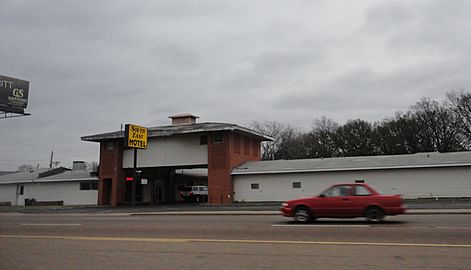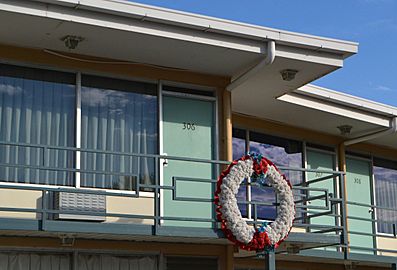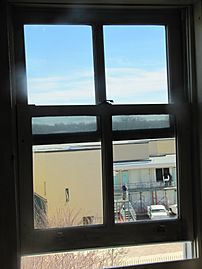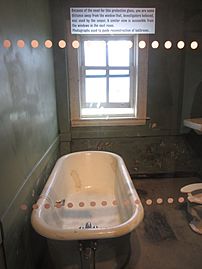Assassination of Martin Luther King Jr. facts for kids
Quick facts for kids Assassination of Martin Luther King Jr. |
|
|---|---|
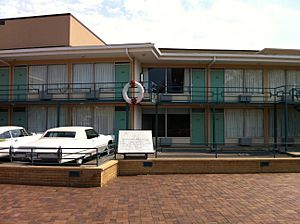
Lorraine Motel in 2012. The wreath marks King's approximate location at the time of his assassination.
|
|
| Location | Lorraine Motel Memphis, Tennessee, U.S. |
| Coordinates | 35°08′04″N 90°03′27″W / 35.1345°N 90.0576°W |
| Date | April 4, 1968 6:01 p.m. (CST (UTC–6)) |
| Target | Martin Luther King Jr. |
|
Attack type
|
Sniper assassination |
| Weapons | Remington 760 Gamemaster .30-06 |
| Deaths | Martin Luther King Jr. |
| Perpetrators |
|
Martin Luther King Jr. was a prominent leader of the civil rights movement and a Nobel Peace Prize laureate who was known for his use of nonviolence and civil disobedience. He was fatally shot at the Lorraine Motel in Memphis, Tennessee, on April 4, 1968, at 6:01 p.m. CST. He was rushed to St. Joseph's Hospital, where he died at 7:05 p.m.
James Earl Ray, a fugitive from the Missouri State Penitentiary, was arrested on June 8, 1968, at London's Heathrow Airport, extradited to the United States and charged with the crime. On March 10, 1969, he pleaded guilty and was sentenced to 99 years in the Tennessee State Penitentiary. He later made many attempts to withdraw his guilty plea and to be tried by a jury, but was unsuccessful. Ray died in prison in 1998.
The assassination was one of four major assassinations of the 1960s in the United States, coming several years after the assassination of John F. Kennedy in 1963 and the assassination of Malcolm X in 1965, and two months before the assassination of Robert F. Kennedy in June 1968.
Background
Death threats
As early as the mid-1950s, King had received death threats because of his prominence in the civil rights movement. He had confronted the risk of death, including a nearly fatal wounding in 1958, and made its recognition part of his philosophy. He taught that murder could not stop the struggle for equal rights. After the assassination of President Kennedy in 1963, King told his wife, Coretta Scott King, "This is what is going to happen to me also."
Memphis
King traveled to Memphis, Tennessee, in support of striking African-American city sanitation workers. The workers had staged a walkout on February 11, 1968, to protest unequal wages and working conditions imposed by mayor Henry Loeb. At the time, Memphis paid black workers significantly lower wages than it did white workers. There were no city-issued uniforms, no restrooms, no recognized union, and no grievance procedure for the numerous occasions on which they were underpaid. During Loeb's tenure as mayor, conditions did not significantly improve, and the mounting tensions turned into a strike.
King participated in a massive march in Memphis on March 28, 1968, which ended in violence. On April 3, King returned to Memphis to attempt a successful new march later that week. His airline flight to Memphis was delayed by a bomb threat, but he arrived in time to make a planned speech to a gathering at the Mason Temple (world headquarters of the Church of God in Christ).
At the Mason Temple, King delivered his famous "I've Been to the Mountaintop" speech. In it, he recalled his 1958 attempted assassination.
As he neared the close, he prophetically referred to the bomb threat:
And then I got to Memphis. And some began to say the threats ... or talk about the threats that were out. What would happen to me from some of our sick white brothers? Well, I don't know what will happen now. We've got some difficult days ahead. But it doesn't matter with me now. Because I've been to the mountaintop. And I don't mind. Like anybody, I would like to live a long life. Longevity has its place. But I'm not concerned about that now. I just want to do God's will. And He's allowed me to go up to the mountain. And I've looked over. And I've seen the promised land. I may not get there with you. But I want you to know tonight, that we, as a people, will get to the promised land! And so I'm happy, tonight. I'm not worried about anything. I'm not fearing any man. My eyes have seen the glory of the coming of the Lord!
Assassination
On Thursday, April 4, 1968, King was staying in room 306 at the Lorraine Motel in Memphis. The motel was owned by businessman Walter Bailey and was named after his wife. Reverend Ralph Abernathy, a colleague and friend, later told the House Select Committee on Assassinations that he and King had stayed in Room 306 at the Lorraine Motel so often that it was known as the "King–Abernathy Suite".
According to biographer Taylor Branch, King's last words were to musician Ben Branch, who was scheduled to perform that night at a planned event. King said, "Ben, make sure you play 'Take My Hand, Precious Lord' in the meeting tonight. Play it real pretty."
According to Rev. Samuel Kyles, who was standing several feet away, King was leaning over the balcony railing in front of Room 306 and was speaking with Rev. Jesse Jackson when the shot rang out. King was struck at 6:01 p.m. by a single .30-06 bullet fired from a Remington Model 760 rifle. King fell backward onto the balcony, unconscious.
Abernathy heard the shot from inside the motel room and ran to the balcony to find King on the deck. Andrew Young, a colleague from the Southern Christian Leadership Conference, first believed King was dead, but found he still had a pulse.
King was rushed to St. Joseph's Hospital, where doctors performed cardiopulmonary resuscitation. He never regained consciousness and died at 7:05 p.m. According to Branch, King's autopsy revealed that his heart was in the condition of a 60-year-old man rather than that of a 39-year-old such as King, which Branch attributed to the stress of King's 13 years in the civil rights movement.
Shortly after the shot was fired, witnesses saw a man, later believed to be James Earl Ray, fleeing from a rooming house across the street from the Lorraine Motel. Ray had been renting a room in the boarding house. Police found a package dumped close to the site that included a rifle and binoculars, both with Ray's fingerprints. Ray had purchased the rifle under an alias six days earlier. A worldwide manhunt was triggered that culminated in Ray's arrest at Heathrow Airport, London, two months later. On March 10, 1969, he pleaded guilty to the first degree murder of Martin Luther King Jr., which was later recanted.
Riots
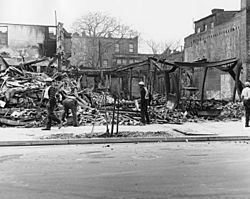
Colleagues of King in the civil rights movement called for a nonviolent response to the assassination to honor his most deeply held beliefs. Despite the urging for calm by many leaders, a nationwide wave of riots erupted in more than 100 cities. After the assassination, the city of Memphis quickly settled the strike on favorable terms to the sanitation workers.
Funeral
A crowd of 300,000 attended King's funeral on April 9. Vice President Hubert Humphrey attended on behalf of Johnson, who was at a meeting on the Vietnam War at Camp David; there were fears that Johnson might be hit with protests and abuse over the war if he attended the funeral. At his widow's request, King's last sermon at Ebenezer Baptist Church was played at the funeral; it was a recording of his "Drum Major" sermon given on February 4, 1968. In that sermon, he asked that, at his funeral, no mention of his awards and honors be made, but that it be said he tried to "feed the hungry", "clothe the naked", "be right on the [Vietnam] war question", and "love and serve humanity".
See also
 In Spanish: Asesinato de Martin Luther King para niños
In Spanish: Asesinato de Martin Luther King para niños
- Assassination of Malcolm X
- "I've Been to the Mountaintop"
- Post–civil rights era in African-American history


